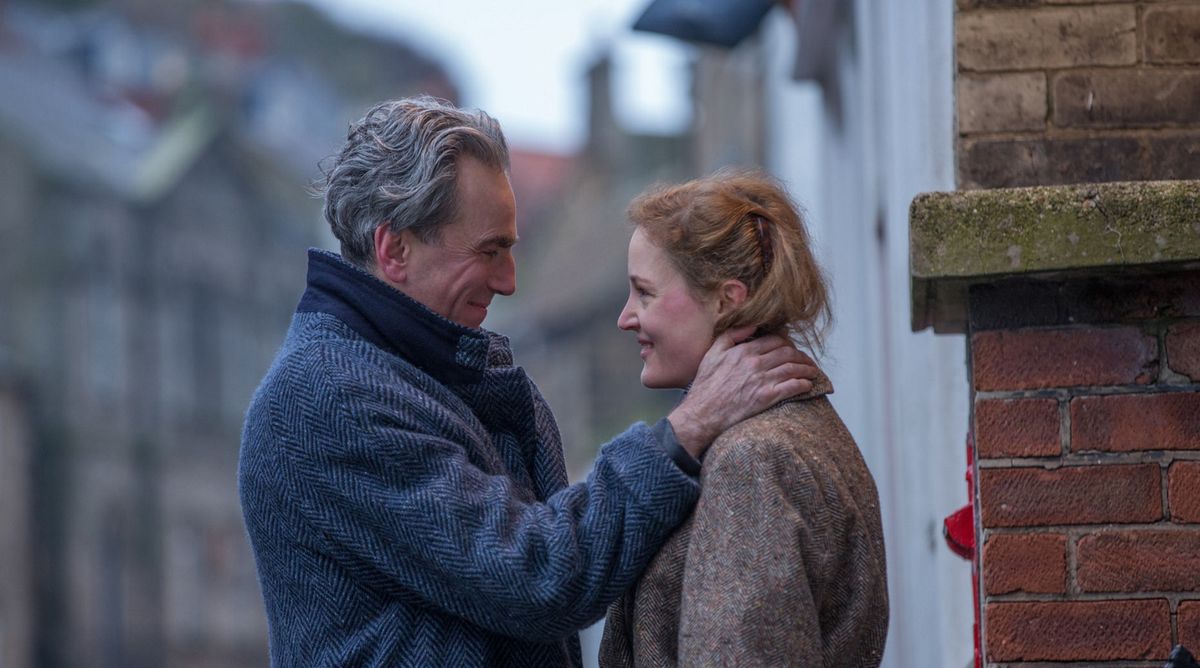12DOVE Verdict
Anderson crafts another classic of obsession and strange love, played by dynamite leads: Day-Lewis retires in style, Krieps is revelatory.
Why you can trust 12DOVE
In many film romances, a belief in finding ‘the one’ is woven deep into the plot fabric. But what if the lead character is a mother-fixated, man-child creative with a profound inability to countenance disturbance or compromise? What might this genius’ chosen ‘one’ look like?
Ask Paul Thomas Anderson, who knows all about complicated love between complicated individuals. True, his eighth feature initially seems another radical departure in a career of many. If Boogie Nights and Magnolia offered sprawling, emotive contrasts to Hard Eight’s clipped neo-noir cool, Punch-Drunk Love was a short, sharp about-turn again. There Will Be Blood affirmed Anderson’s radicalism; The Master went weirder with its close-coiled cult dissections; and Inherent Vice loosened the coils for ramshackle private dick-ery.

At first, Phantom Thread’s tightwound front couldn’t seem more different. Set at a rarefied remove from its ’50s backdrop, it presents a meticulous character study of fastidious clothes designer Reynolds Woodcock, played by Daniel Day-Lewis in a performance pinched with hollowed-out precision.
But remember how love was impossible in Magnolia or destabilising in Punch-Drunk, or how isolated from the world Blood’s Daniel Plainview and Vice’s dope-distanced Doc were: gradually, it becomes clear how Anderson’s vision is sewn into Phantom’s threads.
Both impressive in his mono-minded mania and absurd in his neediness, Woodcock joins these Anderson-ites in vividly drawn, all-consuming obsession. He likes everything just so and cannot abide idle chat. The characterisation is finessed down to every verbal repetition: he’ll often restate his points with subtly varied wording, as if he can’t perceive disagreement as anything but a simple failure to understand.

Anderson initially seems to revel in this splendid isolation, matching Woodcock’s precision in fine details. This is cinema of refined self-containment, music and image merged in rhapsodic artifice. At Woodcock’s London house, workers arrive in rapt formation, rising to Jonny Greenwood’s swelling score for one of the greatest stairwell scenes since Hitchcock.
On which note, enter Vicky Krieps’ hotel waitress Alma, catching Reynolds’ eye as she trips over herself. Like a child trying to impress mother, Reynolds courts her by ordering a whopping brekkie with painstaking relish. Not too runny with the egg, thanks. She accepts his invitation to dinner and his house, where, with further fastidiousness, he begins to dress her. (As Aimee Mann almost sang in Magnolia, Alma looks like a perfect fit to him.)
If Vertigo pops to mind before you can say “makeover”, the set-up veers towards Hitch’s Rebecca as Reynolds’ sister Cyril (a fiercely immovable Lesley Manville) lurks like some ever-present, Mrs. Danvers-ish power behind his throne. More strangely still, Alma doesn’t run screaming like she’s seen Reynolds’ mother’s ghost, by whom he’s haunted.

When Alma becomes entwined with Reynolds, his needs prove dictatorial. Their oppressive ludicrousness is exposed with sharp concision: when Alma cooks him buttered asparagus, it ignites one of the greatest foodbased tantrums since Jack Nicholson’s menu meltdown in Five Easy Pieces.
As Alma suffocates in the no-man’s-land between Cyril and Reynolds, Anderson flirts with claustrophobic ‘artist and muse’ psycho-drama terrain. But Phantom isn’t Aronofsky’s mother! with none-too-runny eggs on top. This is Anderson’s film, not least because its core relationship is never simplified. Krieps is an intuitive revelation whose disarmingly direct character keeps surprising us.
What follows is a duet charged with complexity and mystery, with a startling kink that could hardly have come from another filmmaker. Though Anderson echoes Bergman and Hitch, he stretches Phantom out on exquisitely nuanced, extraordinarily singular lines.
Building mysteries that demand unravelling, it subverts expectation throughout. Just when you have it pegged as a chamber piece of parched emotions, Julia Davis’ venomous cameo and a volcanic party blindside you. Elsewhere, Day-Lewis’ sublime performance treads a knife-edge of cruelty and comedy, tonal extremes beautifully balanced under Anderson’s watch.
Despite its refinement, Phantom comes cut from the cloth of lived-in enigmas. And there’s no greater enigma here than love, which Anderson views as unfathomable to outsiders and unsustainable between strong-minded people without something breaking. In other words, without spoiling anything, you can’t make omelettes without cracking eggs. Nor can you mistake this study of choppy romance for anything but the work of one of modern cinema’s great risk-takers.
Kevin Harley is a freelance journalist with bylines at Total Film, Radio Times, The List, and others, specializing in film and music coverage. He can most commonly be found writing movie reviews and previews at 12DOVE.

With no remaster in sight because Sony hates money and also me, I'm spending Bloodborne's 10-year anniversary thinking about its hardest, perfect boss battle

Nintendo Today just told me how to beat World 1 of Super Mario Bros 40 years too late

The Amazon Spring Sale has a massive selection of board games discounted this weekend












